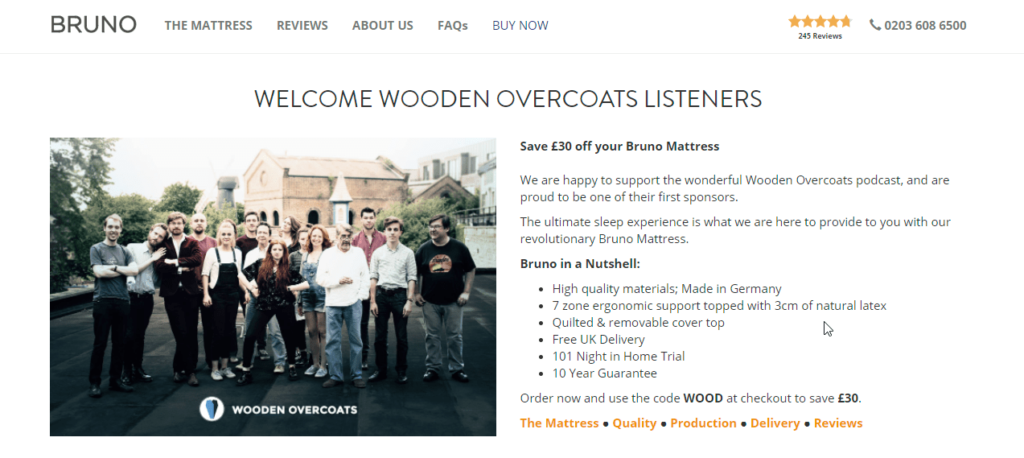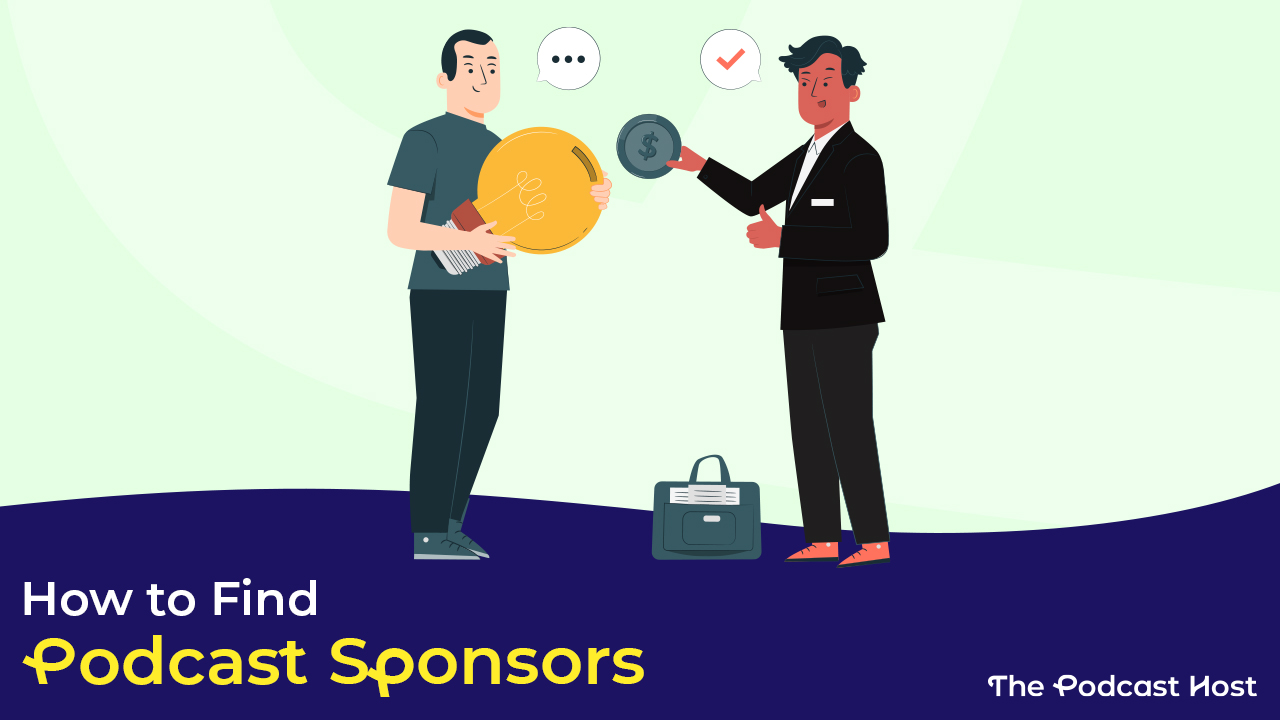Podcasters and sponsors help each other in ways that redefine marketing. Recently, we gave you some tips on how to do podcast sponsorship. We showed you what it is and how it works.
But how do you get a podcast sponsor’s handshake? Once you’ve got it, how do you keep that relationship productive?
Let’s take a look at some ways you can sustain podcast sponsorship, as well as some tips and examples from podcast pros.
Reach out with a helpful hand.
Engage potential podcast sponsors with a friendly email. Be professional, and conversational. Tell them:
- What you can do for them (you’re providing them with advertising targeted to a niche market)
- Who you are and what your show is about
- Your current number of downloads (and geographic reach, if you have it)
- A link to your media kit
- How they can contact you for more information
For an extra little bit of impact, save any personal “How are you?” questions or statements until the end of the email, before you thank them and sign off. Amanda McLoughlin of Multitude mentioned this in her sponsorship talk at PodCon 2. It’s always worked well for me. This way, you get to the point of the email immediately. You also wrap up the email with some warmth.
Here’s a quick example.
Dear (Marketing Person for TroutLures Unlimited);
Advertising with our podcast, Fly Fishing In America, can help you reach more potential customers in the Pacific Northwest. My name is Lindsay, and I’m the host and producer of this podcast. Our show provides weekly episodes, covering topics important to fly-fishing enthusiasts across the US. Currently, we get about 250 downloads per episode, 67% of which are in Oregon, Washington State, and Northern California. If you’d like to listen, you might try Episode 4, about stream side tools. We have a full media kit with more information about our podcast available at this link: www.flyfishinginamerica.net./mediakit. You can also email me at your earliest convenience to discuss it.
How are you? Hope this trout season is productive for you.
Sincerely
Lindsay Harris Friel
Producer/Host, Fly Fishing In America
Keep it short and sweet.
Know your podcast’s audience.
Sponsors depend on target marketing to sell their products. Studies show that podcasting is an effective means of advertising. Podcasts are the most intimate, targeted form of media. Know that these companies need you to reach potential consumers, just as much as you need them. You have a link to people who enjoy a particular thing. These companies need that link.
Audience surveys are a staple of engaging podcast sponsorship. The results will give you concrete data to include in the sponsorship section of your media kit. Your show’s content is an even more important driver to focus your sponsor’s marketing.
Think about your audience avatar. What kind of businesses are they likely to need? Let’s say your podcast avatar is a single mom who listens to your show for inexpensive activities to do with her children. Is she going to pay attention to ads for a luxury automobile dealership, or will she skip them? An honest assessment of your listener, as well as your podcast sponsor, go hand in hand.
No matter the quantity of your downloads, consider your podcast’s focus. Let’s say that your podcast is about fly fishing, and the majority of your downloads are in the midwestern US, with fewer than 250 downloads per episode. Consider searching through Etsy to find someone who sells handmade fishing lures, and ships from the midwestern US. They might be so intrigued by your podcast, that they’d make a specialized lure as a marketing tie in, in addition to offering a discount code.
Know the sponsor’s product.
Once they’re interested in working with you, ask for a product sample. Companies want genuine, honest ad reads. Nothing is worse than a stale, emotionless ad read, from someone who’s unfamiliar with the product.

Be creative, respectfully.
Companies have supported audio entertainment since radio was invented. Listeners almost expect ads. It might feel awkward to turn away from your show’s topic to read an ad. If it feels awkward, chances are good that you have the wrong product for your show. For example, If your show is about beef barbecue cooking, ads for a vegan meal kit service might not be a good fit.
Ads that are “baked in” to the show (not added to the RSS feed, but read by a host) need to share or carry a similar tone. Listeners will accept them, and not fast-forward, if they ad read is entertaining.
For example, in the audio drama sitcom Wooden Overcoats, some episodes included a brief comedy sketch, in which the characters complained about being miserable from a lack of sleep. Then they’d discuss how a mattress from a particular manufacturer solved the problem.
Use appropriate enthusiasm to make the sponsor’s ad read entertaining. In Potterless, a show about reading Harry Potter novels for the first time, host Eric Schubes announces his ad reads with a parody of a magic spell: “Wingardium ad-read-osa!” He doesn’t just say, “let’s go,” he Potterizes it.
Find an intersection of meaning between the sponsor’s product and the particular podcast episode’s topic. Pod Save America’s episode about the first round of US Democratic candidate debates featured an ad for an employment recruiting company. They emphasized how too many candidates could be confusing, but a recruitment agency would help it make sense.
When you read ads, stick to the sponsor’s preferred talking points. Own it, highlight it, take responsibility, make it your own and a good fit for the episode. Podcast sponsors support you making your show, and that’s worth getting excited about.
Transparency
I asked podcaster Paul A.T. Wilson, of Folklore and Stories From The Sacred Isle, about his experience maintaining a relationship with sponsors. He’s been podcasting on different topics for many years, and is generous with his knowledge.
Like I said earlier, part of your media kit should include data on downloads and geographic reach for sponsors. Wilson mentioned that you should update this as time evolves, and keep that information fresh. Some sponsors will ask for updates on your download stats on their own timetable.
You should know what your sponsors are doing, too. Set up a Google Alert for news about the company. Let’s say your podcast is about fresh water fly fishing. You learn that one of your sponsors is doing something harmful to rivers. You might want to have a conversation with them about continuing your relationship. Like any relationship, it’s important to check in on a regular basis.
It’s possible to send your media packet to a company that will pick and choose sponsors for you, based on your downloads and topic. Many companies use an affiliate marketing firm, rather than deal directly with podcasters. Wilson said, “There is room to do it yourself, it’s just a lot of work. I don’t work with third parties, never have, because a lot of the time they take a large chunk of the revenue.” He also said, “I would always recommend doing it yourself, and cut out third parties if you can.”
Communication is key to any relationship.
Podcasters have to be multifaceted. They have to treat each facet as the most important part of making their podcast. While sponsors are not literally your friend, you should treat them like one. Give them clear, honest and relevant information, and treat their product as an important part of your show. The product or service that you advertise is real and concrete. It’s not just talking points on a page.
The more your relationship to your audience is real to your sponsor, the more valuable you will be to them.
For a view of relationship from the sponsor’s side, have a look at our article, Should I Sponsor a Podcast? This is a resource you can use when talking to potential sponsors about how it all works – and how much it can benefit them.
Sponsorship isn’t the only way to make your podcast pay for itself. There are many ways to monetise your podcast. To learn more, join Podcraft Academy. That’s where you’ll have access to resources like our Podcast Monetisation Course, our Find a Podcast Sponsor resource, as well as everything else in there, from live Q&As to community forums!
